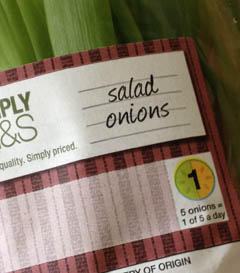The EU rules that spring onions must now be called salad onions?
Code or canard it exemplifies the dire state of the union
 I don’t pay much attention when I’m out shopping. I just see the stuff I want and throw it in my basket once I’ve pushed my way through the loitering mass of picky package-squeezers who seem to feel the need to man-handle (or more accurately in this case woman-handle) everything on the shelf before selecting which to take.
I don’t pay much attention when I’m out shopping. I just see the stuff I want and throw it in my basket once I’ve pushed my way through the loitering mass of picky package-squeezers who seem to feel the need to man-handle (or more accurately in this case woman-handle) everything on the shelf before selecting which to take.
Therefore I was particularly ill prepared, on a recent trip to my local convenience store, for the exchange of small talk that greeted me at the checkout:-
Cashier: Spring, er, Salad onions … (sarcastic smile) … we can’t call them spring onions any more.
PPW: (eyes narrowing) Why’s that?
Cashier: European regulations … we can’t call them spring onions because they’re grown all year round so we have to call them salad onions from now on.
PPW: (eyes rolling) Urrgh … makes me want to vote UKIP.
The case for the defence
While, like many of my countrymen, I despair of the bloated bureaucracy and petty policymaking of the European Union and recognise its urgent need for reform and realignment I will not, of course, be voting UKIP. That was just an idle one-liner at the corner store.
As a man with a passing interest in economics I recognise that whether Britain is in the EU or out of it Europe will remain our biggest trading partner and therefore we’ll be subject to the vast majority of its legislation anyway. At least from the inside we have some say in those rules and the most possible forewarning that they’re coming, unlike countries like Norway and Switzerland who can only wait in fear for them to come off the fax machine.
As a man who has read How to win friends and influence people, Dale Carnegie’s unfortunately cheesily named 1937 classic on the psychology of people handling, I also acknowledge that by far the best way to change others is to work with them, to show them respect and make your objectives coincide with theirs, rather than hurl abuse and threats from the periphery and threaten to take your ball home.
And as a born sceptic I recognise that any story, whether from the media or from the man in the street, that plays to prevailing populism cannot be taken at face value.
And this one smells a little bit like horseshit to me.
The case for the prosecution
But it seems to me that in this example the truth doesn’t actually matter because the problem with this example isn’t its factual accuracy but its believability.
Yet, if it were the result of a clear and specific decision from the European policy machine few of us would be surprised. It’s exactly the sort of micro-meddling that the populist press love to jump on and therefore, fairly or otherwise, we’ve all come to expect. It’s therefore equally believable that someone would presume a supermarket changing the name of its salad products for no apparently good reason was doing so because of an EU regulation; the story starts to spread and another widely accepted canard is born.
A shopping basket-case
May’s European elections lived up to two widely trailed expectations.
First was the predictably low voter turnout. The UK managed little over 1 in 3 people bothering to cast their euro-ballot, though that’s actually pretty respectable compared to previous euro-votes.
Second was the expected rise in the share of votes for anti-Europe parties. Taking a couple of examples from the subsequent coverage in The Economist Britain’s UK Independence party managed over 27% while France’s National Front got around 25%. Overall the broadly Eurosceptic parties will occupy over a quarter of the seats in the next European parliament.
Both reflect an unhealthy degree of disinterest and disdain for the European Union and this is as much a result of its political performance (or lack thereof) as it is of popular perceptions (or indeed misconceptions).
The EU needs to work better at the things that really matter and perhaps more importantly needs to show it’s working better at the things that really matter. The UK may face a referendum on its EU membership over the next few years and I doubt the turnout will be anywhere near as weak if it does.
And, unless things change, I also doubt we’ll be the last country to get one.